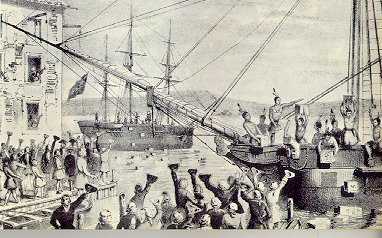
< Previous Page * Next Page >
The constitutional issue thus drawn centered on the question of representation. From the colonial point of view, it was impossible for the colonies to consider themselves represented in Parliament unless they actually elected members to the House of Commons. But this conflicted with the orthodox English principle of "virtual representation" -that is, representation by classes and interests rather than by locality. Most British officials held that Parliament was an imperial body which represented and exercised the same authority over the colonies as the homeland. It could pass laws for Massachusetts as it could for Berkshire in England. But the American leaders argued that no "imperial" Parliament existed and that their only legal relations were with the Crown. It was the King who had agreed to establish colonies beyond the sea and the King who provided them with governments. That the King was equally a King of England and a King of Massachusetts they agreed, but that the English Parliament had no more right to pass laws for Massachusetts than the Massachusetts legislature had to pass laws for England they also firmly insisted. If the King wanted money from a colony, he could ask for a grant, but a British subject, whether in England or America, was to be taxed only by and through his own representatives. British parliamentaries were naturally unwilling to accept the colonial contentions. But British merchants exerted effective pressure. Feeling the effects of the American boycott, they threw their weight behind a repeal movement and in 1766 Parliament yielded, repealing the Stamp Act and greatly modifying the Sugar Act. Throughout the colonies the news evoked spirited rejoicing. The merchants gave up the nonimportation agreements; the Sons of Liberty subsided; trade resumed its course, and peace seemed at hand.
But it was only a respite - for in 1767 came another series of measures which stirred anew all the elements of discord. At that time, Charles Townshend, British Chancellor of the Exchequer, was called upon to draft a new fiscal program for the government. Intent upon reducing British taxes by making more efficient the collection of duties levied on American trade, he tightened up customs administration, at the same time sponsoring duties on paper, glass, lead, and tea exported from Britain to the colonies. This was designed to raise revenue to be used in part to support colonial governors, judges, customs officers, and the British army in America. Another act suggested by Townshend authorized the superior courts of the colonies to issue writs of assistance, thus giving specific legal authority to the general search warrants so hateful to the colonists.
The agitation following enactment of the Townshend duties was less violent than that stirred by the Stamp Act, but it was nevertheless strong. Merchants once again resorted to nonimportation agreements. Men dressed in homespun, women found substitutes for tea, students used colonial-made paper, and houses went unpainted. In Boston, where the mercantile interests were most sensitive to any interference, enforcement of the new regulations provoked violence. When customs officials sought to collect duties, they were set upon by the populace and roughly handled. For this, two regiments were dispatched to protect the customs commissioners.
 |
| When peaceful means failed to break the East Indian Company's monopoly, colonists resorted to direct action. Disguised as Indians, they boarded the ships, broke the chests, and threw the tea cargoes overboard |
Faced with such opposition, Parliament in 1770 decided to beat a strategic retreat and repealed all of the Townshend duties except that on tea. The "tea tax" was retained because, as George III said, there must always be one tax to keep up the right. To a majority of the colonists, the action of Parliament constituted, in effect, a "redress of grievances," and the campaign against England was largely dropped. There continued an embargo on "English tea," but agitation was on a modest scale, and the embargo was apparently not too scrupulously observed. Generally, the situation seemed auspicious for imperial relations. Prosperity was increasing and most colonial leaders were willing to let the future take care of itself. Inertia and neglect seemed to succeed where bolder policies had failed. The moderate element, everywhere predominant in the colonies, welcomed this peaceful interlude.
< Previous Page * Next Page >